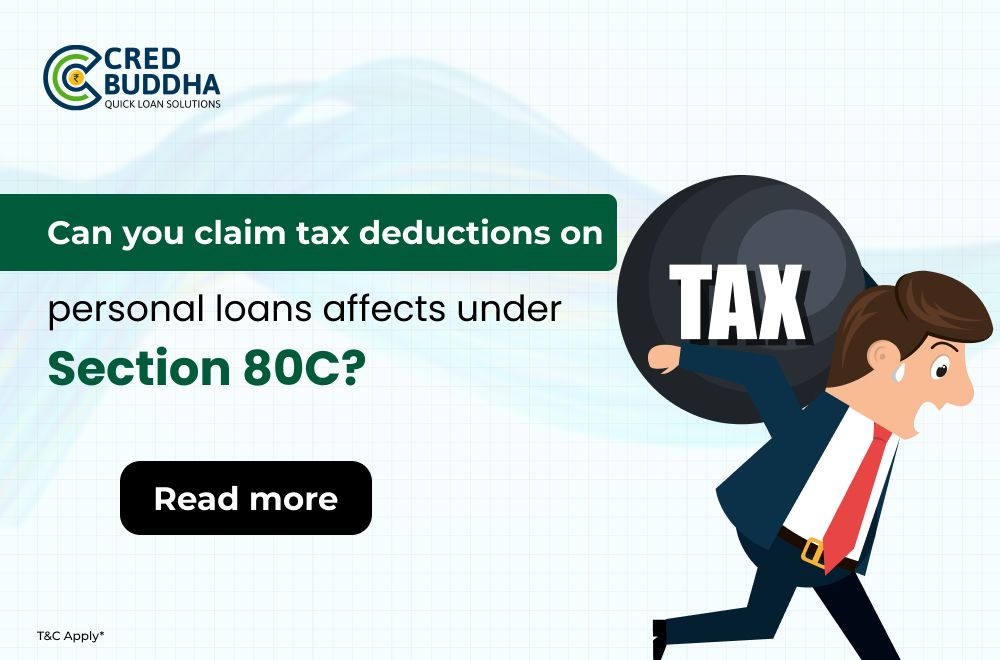
Can you Claim Tax Deductions on Personal Loans Under Section 80C?
Can you Claim Tax Deductions on Personal Loans Under Section 80C?
Let’s get one thing straight—personal loans are like the financial equivalent of a best friend in a crisis. When life throws a curveball—be it a medical emergency, a big fat Indian wedding, home makeover, or an unplanned expense—personal loans show up with a comforting “I got you.”
But come tax season, a million questions start swirling. The big one?
“Can I get a tax break on this personal loan under Section 80C?” It’s a fair question. After all, who doesn’t want to save on taxes, especially after paying hefty EMIs?
Spoiler alert: The answer isn’t a simple yes or no. But don’t worry—this blog will decode everything for you. Think of it as a friendly financial chat minus the boring jargon.
Let’s Start With the Basics: What Is Section 80C?
Before diving into personal loans, let’s rewind a bit.
Section 80C of the Income Tax Act, 1961 is basically the go-to tax-saving section for most salaried individuals and even HUFs. It allows you to claim a deduction of up to ₹1.5 lakh per financial year on eligible investments and expenses.
Now, here’s a quick look at what usually qualifies:
Did you spot “personal loans” in there? Nope. Because it’s not there.
So... Are Personal Loans Excluded?
Well, technically yes. Personal loans are not explicitly listed under Section 80C. That means if you’ve taken one for general needs like a vacation, wedding, or paying off your credit card dues—there’s no direct tax benefit.
But—and this is the exciting part—if the purpose of your personal loan serves a specific goal, then you might still score some tax perks.
It’s not just about taking the loan; it’s about why you took it.
When a Personal Loan Might Help You Save on Taxes
Let’s break this down scenario by scenario, because some use-cases can help you enjoy tax benefits—just not always under Section 80C.
1. For Buying or Constructing a House
Used your personal loan to buy a new house or build one from scratch? You could claim a deduction under Section 24(b) for the interest paid on the loan.
Yes, it’s not 80C, but it still saves you money!
You can claim up to ₹2 lakh annually if:
Tip: Maintain those invoices and builder receipts—they could be your tax-saving superheroes.
2. For Renovating Your Home
Giving your home a facelift using personal loan funds? Section 24(b) still has your back—only this time for home improvement.
From new flooring to plumbing fixes, if you can link the expense trail to your loan, you might be able to claim interest deductions. But again—only interest, not principal.
3. For Business Purposes
Entrepreneurs and freelancers, this one's for you.
If you’ve used the personal loan to fund your business—maybe for equipment, office rent, hiring, or marketing—the interest you pay on that loan can be claimed as a business expense under Section 37(1).
This deduction reduces your taxable profits, which directly means lower taxes.
So, while it’s not under 80C, it’s still a smart, money-saving move.
4. For Investing in Capital Assets
Say you used your personal loan to buy shares, gold, or even mutual funds. While you can’t claim a direct deduction immediately, here’s what happens:
When you sell these assets, the interest you paid on the loan can be added to the cost of acquisition. That means your capital gains get reduced, which in turn lowers your tax burden.
It's like playing the long game in tax planning—and it pays off if done right.
When You Can’t Claim Anything at All
Alright, now let’s talk about the situations where no matter how heartfelt the reason, no tax benefit is coming your way.
If your personal loan was used for:
…then unfortunately, you’re on your own when it comes to taxes. These expenses, while valid in real life, don’t hold any weight in the tax department’s eyes.
Why the Section 80C Confusion?
Here's why many people get this wrong: home loans qualify under both Section 80C and Section 24(b)—80C for principal repayment, and 24(b) for interest.
Personal loans don’t have this dual benefit structure. They are unsecured, meaning they aren’t tied to a specific asset unless you use them for something like home construction. That’s where the confusion comes from.
Keep Your Papers Close—Always
Documentation isn’t just a buzzword here—it’s your ticket to claiming any tax benefit. Whether it’s for home improvement, business use, or asset purchase, ensure you keep:
If the IT department comes knocking, you’ll want to be armed with evidence, not just intent.
In Conclusion: Be Smart with Borrowing
Here’s the final word—you can’t claim personal loan deductions under Section 80C unless the loan is used for a home loan principal repayment, which is rare. But depending on your loan’s purpose, you might still be eligible for deductions under Section 24(b) or Section 37(1).
It all boils down to how, why, and where you used the money.
So, the next time you plan to take a personal loan, don’t just think of how much EMI you can handle. Think about how that loan fits into your broader financial and tax-saving strategy.
At CredBuddha, we don’t just give you a loan—we help you borrow smarter. Whether you're renovating your dream home, investing in your startup, or looking to save taxes the legal way, we guide you through every step.
Our team helps you understand the tax implications of how you use your loan, and ensures you’re set up with the right documentation from day one. No surprises. No stress. Just pure financial clarity.
Because let’s face it—tax planning is tricky, and you deserve a financial partner who doesn’t just talk in numbers but speaks your language. With CredBuddha, it’s not just about borrowing; it’s about borrowing with a purpose.